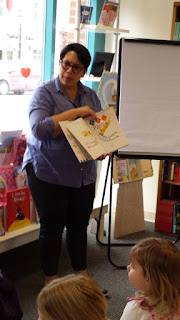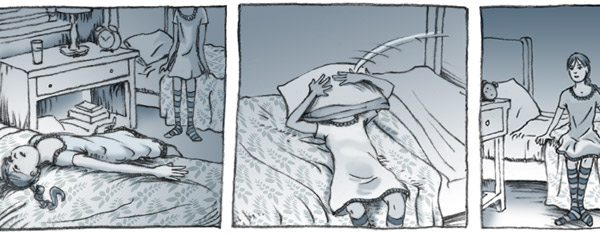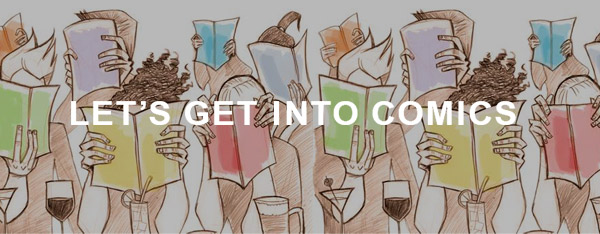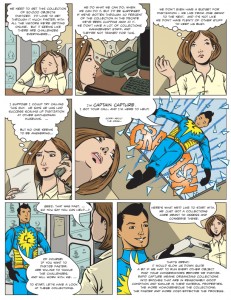 J.C. Thomas is appearing at Big Planet Comics Washington on Saturday February 18 (2-4 pm) to sign his two books. From his press release: "J.C. Thomas is a writer, artist and public elementary school teacher from Northern Virginia. His first children’s book, Ninja Mouse: Haiku, earned acclaim from both Publishers’ Weekly and The Midwest Book Review, and
won a Gold Benjamin Franklin Digital Award from the Independent Book
Publishers Association. He will be signing copies of Ninja Mouse: Haiku and The Gates of Dawn, an original graphic novel by Philadelphia-based writer Benjamin Finkel. Ninja Mouse: Haiku is a collection of haiku poetry with themes of martial arts philosophy and nature and includes Japanese translations. In The Gates of Dawn, a
young girl with special powers and a nomadic veteran flee across a
barren stretch of Utah as they’re pursued by a dark terror. Finding
themselves cornered and desperate, they’re forced to make a final stand."
J.C. Thomas is appearing at Big Planet Comics Washington on Saturday February 18 (2-4 pm) to sign his two books. From his press release: "J.C. Thomas is a writer, artist and public elementary school teacher from Northern Virginia. His first children’s book, Ninja Mouse: Haiku, earned acclaim from both Publishers’ Weekly and The Midwest Book Review, and
won a Gold Benjamin Franklin Digital Award from the Independent Book
Publishers Association. He will be signing copies of Ninja Mouse: Haiku and The Gates of Dawn, an original graphic novel by Philadelphia-based writer Benjamin Finkel. Ninja Mouse: Haiku is a collection of haiku poetry with themes of martial arts philosophy and nature and includes Japanese translations. In The Gates of Dawn, a
young girl with special powers and a nomadic veteran flee across a
barren stretch of Utah as they’re pursued by a dark terror. Finding
themselves cornered and desperate, they’re forced to make a final stand." What type of cartooning or comic work do you do?
For now, I mostly work on one-shot, short graphic novels as opposed to serialized comics work. It’s partly a preference, partly circumstantial, and partly a product of the collaborations I’ve built in the last year or so.
How do you do it? Traditional pen and ink, computer or a combination?
I create all of my work on a custom-built PC. I use a lot of 3D models as the basis for my artwork. My main software applications are DAZ Studio, Photoshop, Octane Render, and Manga Studio. I use a Wacom Intuos for touching up line work.
I’m hoping to venture into paper and ink for some projects in the future, but for now my workflow is pretty set.

When (within a decade is fine) and where were you born?
I was born in Northern Virginia in the early 1980s.
Why are you in Washington now? What neighborhood or area do you live in?
I’m in the Washington area now because I’ve stayed here. I’m in Sterling, VA, which is about thirty minutes west of Washington. I’ve been all over, but I keep coming back to home.
What is your training and/or education in cartooning?
My “training” in cartooning is all informal. As a kid, I gobbled up every how-to book I could, from How to Draw Comics the Marvel Way to Will Eisner’s Graphic Storytelling. Scott McCloud’s Understanding Comics was also a big part of my comics “education.” I took art throughout high school but was always frustrated with the lack of respect comics art tended to be treated with.
 Who are your influences?
Who are your influences?I probably have too many subconscious influences to count, but there are some I’m more aware of. Visually, I’d have to say Alex Maleev, Jae Lee and Michael Lark are influences. I really dig their use of heavy blacks. Pacing wise, I’ve always loved the dynamic between Garth Ennis and three of his common artists: Leandro Fernandez, Steve Dillon, and John McCrea. I’d also cite Sam Esmail, the creator and director of Mr. Robot, as an influence, especially on The Gates of Dawn. The cinematography in that show had a big influence on the framing in The Gates of Dawn. Jeff Lemire is also an influence. He’s a master of knowing exactly what to draw and when to draw it, really maximizes the impact of every panel. Essex County, Lost Dogs, and The Underwater Wielder are some of my favorites of his work.
If you could, what in your career would you do-over or change?
I’d either choose to have studied something creative in undergrad, rather than International Relations, or to have studied education in undergrad. Being involved in education can really spark your creativity, and a lot of my ideas have their origins in something education-related. I wouldn’t have minded if some of those sparks were to have come earlier.
I think also I wish I had explored getting representation a bit more when I first finished Ninja Mouse. I contacted a couple of literary agents, and when I didn’t hear back within a couple of weeks, I went ahead and published it on my own. I say that with some lack of certainty, because self-publishing is great fun and very rewarding in pretty much every way except financially. But once Publisher’s Weekly released their review, agents were contacting me, but I didn’t have anything else to show them at the time. I could have probably let that play out differently and have ended up with an agent right off the bat. But the freedom that goes with being on your own is a definite perk.
 What work are you best-known for?
What work are you best-known for?Probably Ninja Mouse: Haiku. It received praise from Publisher’s Weekly and The Midwest Book Review, which was a pretty big deal for me at the time. It’s also the first work on I got onto Comixology, which was validating.
What work are you most proud of?
I’d have to say Ninja Mouse: Haiku again. A lot of love and work went into that project, and I was really happy with the final product.
What would you like to do or work on in the future?
Geez, what don’t I want to work on in the future? I’ve got a scifi anthology in the works that I’m anxious to finish. The second story in that project, Arcas, with writer Christopher Hutton, is almost finished and should be out in a couple weeks. I’ve also got a couple of screenplays that I plan on adapting into graphic novel format.
 But the thing I’m looking forward to the most is the next Ninja Mouse project. The first book was a collection of haiku poetry about martial arts and nature, illustrated sequentially with a very loose story. The next project will be a more traditional graphic novel. I’m planning on three volumes for that one.
But the thing I’m looking forward to the most is the next Ninja Mouse project. The first book was a collection of haiku poetry about martial arts and nature, illustrated sequentially with a very loose story. The next project will be a more traditional graphic novel. I’m planning on three volumes for that one.Other than a horde of my own projects that are in various stages of production, I’d love to do some mainstream work at some point. Batman, the Punisher, and Shang-Chi, of Master of Kung Fu Fame, are probably my favorite characters from the Big Two, and I’d jump at the chance to do work on any of them.
What do you do when you're in a rut or have writer's block?
When I’m in a rut or have writer’s block, I normally try to work on a different project. I ran into more than the average amount of ruts with Arcas, and each time I’d try to get some work done on something I’d put on the backburner. On one hand, that’s a positive of balancing a lot of different projects at once. On the other, obvious, hand, it can be distracting or can hinder my productivity to have a lot of projects going on at the same time. I also turn to music to get me out of a rut.
 What do you think will be the future of your field?
What do you think will be the future of your field? That’s a good question…I don’t know, on the one hand, some trends in the industry make me think the future is looking a bit bleak. The sheer number of universe-redefining, multi-title events from Marvel and DC in the last decade or so has really turned me off from mainstream comics. I don’t really see that changing anytime soon. Don’t get me wrong, there’s been some outliers here and there that I really enjoyed. Jeff LeMire’s Moon Knight comes to mind. But in general, the big two have left me with the feeling that nothing I read matters, because they’re just going to undo and redo it again in a year. I think those types of trends will continue to alienate all but the most hardcore of fans.
On the other hand, I feel like this is a rich time for the art form in general and there are a lot of trends that make me very hopeful about the field. It seems to me there’s been an explosion of talented indie-creators and small press labels in the last five years or so. And we’re lucky to be in an area where there are retailers willing to take risks on small press titles and unknown creators. I’m also very hopeful about the genre diversity we’re seeing now. It used to be that you really had to scrounge around if you wanted to read something without capes and masks, but that’s not the case anymore. I think part of that is due to digital platforms like Comixology. I think digital comics will continue to grow, but I don’t think they’ll ever replace physical comics. I hope that someone… publishers, online retailers, I don’t know who…but I hope that someone can find a way for brick and mortar retailers to get a piece of the digital pie. I think there’s a lot of potential in apps like Madefire as well, which basically adds simple motions, background music and sound effects. It hasn’t taken off yet, probably because there are additional costs to making them and the return isn’t much more than a typical digital comic. But I think the potential is exciting.
 I’m also thrilled to see the increasing acceptance that graphic novels and comics are being met with in schools and libraries. Comics have a place in literacy instruction, and more and more educators are beginning to embrace them.
I’m also thrilled to see the increasing acceptance that graphic novels and comics are being met with in schools and libraries. Comics have a place in literacy instruction, and more and more educators are beginning to embrace them.What local cons do you attend? The Small Press Expo, Intervention, or others? Any comments about attending them?
I’ll be attending the NovaCon this year, which will be my first. I’m planning on attending the Small Press Expo as well. I had a chance to do a signing at last year’s FBCD at Comic Logic in Ashburn, VA, and it was absolutely packed. Like, line-around-the-building packed. I imagine something like that, but on a much larger scale.
What's your favorite thing about DC?
Diversity.
Least favorite?
The soul-killing traffic.
What monument or museum do like to take visitors to?
I have to admit that I don’t really take advantage of the museums and monuments like I should. But I really like the Freer and Sackler galleries. I also had the chance to explore Hillwood Estate recently, and that’s definitely on my short list of favorites.
How about a favorite local restaurant?
I can’t say I know a lot of restaurants in DC proper, but I love Clarity in Vienna. Mokomandy in Sterling is also one of my go-to recommendations.
Do you have a website or blog?
Sure do! It’s www.jc-thomas.com. I’d love for your readers to stop by.












